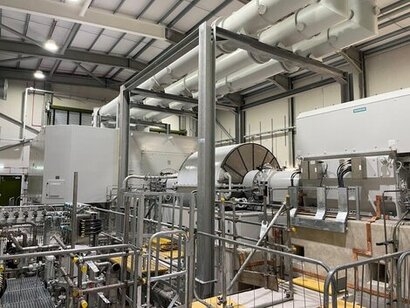Specialist global investment manager focused on renewables, storage and grid support infrastructure, Quinbrook Infrastructure Partners, has announced it has completed construction and commissioning of a new synchronous condenser installation at Rassau, in Ebbw Vale, South Wales, expected to support the stable decarbonisation of the UK electricity supply.
Quinbrook partnered with Welsh Power in the development of the project from concept stage and with Siemens Energy for the construction of Rassau, which can now provide multiple grid support services including: inertia to strengthen the grid; short circuit power to ensure a reliable operation; and reactive power for voltage control2. Siemens Energy committed to the use of local contractors and specialists during construction and since the commencement of civil works in September 2020, more than 300 personnel have been employed on site.
“We view the UK’s ‘Net Zero’ transformation as an unprecedented investment opportunity with a diverse array of attractive thematics” said Rory Quinlan, Co-founder and Managing Partner of Quinbrook. “Quinbrook targets the next generation of critical infrastructure investment that arises directly from the maturation of renewables as the dominant source of power in the UK. Crucially, our ‘whole of system’ approach puts the emphasis on addressing critical system needs and enablers. By delivering innovative and high-impact investments such as the Rassau Synchronous Condenser, our aim is to enable more renewables capacity to be built in the UK, thereby directly contributing to carbon emissions reduction and real progress towards Net Zero.
Rassau is an excellent and timely example of how the energy transition has moved well beyond wind and solar. Additionally, by creating substantial employment opportunities and investment in the communities around the locations of Rassau and the wider Pathfinder portfolio we are proposing, we have the ability to directly support the UK Government’s levelling up agenda to reduce geographic inequality across the country.”
Historically, grid stability in the UK’s power systems has been maintained by large synchronous power plants predominantly fuelled by carbon-intensive coal and gas. These older fossil plants are being phased out and non-synchronous renewable generators, such as wind and solar, pose new reliability challenges as they do not possess the same grid stabilising properties. Due to the rapid proliferation of renewables across the UK, National Grid launched the Pathfinder Programme to source new ways to provide critical grid stability services. Rassau will now offer these services to National Grid using the synchronous condenser technology which operates on a continuous 24/7 basis.
National Grid’s Stability Pathfinder programme offers indexed, long-term contracts to secure essential grid support services from projects like Rassau. The projects that secured a contract in National Grid’s Phase 1 of the Pathfinder Programme6 are expected to collectively save consumers up to GBP 128 million over six years.
The Rassau synchronous condenser project adds to Quinbrook’s recent investments in UK companies all strategically supporting the energy transition including Flexitricity and Habitat Energy and solidifies Quinbrook’s early move into the supply of critical flexible capacity, storage and grid support infrastructure that enables more variable and weather-dependent renewables capacity to be safely accommodated on the UK power grid.

